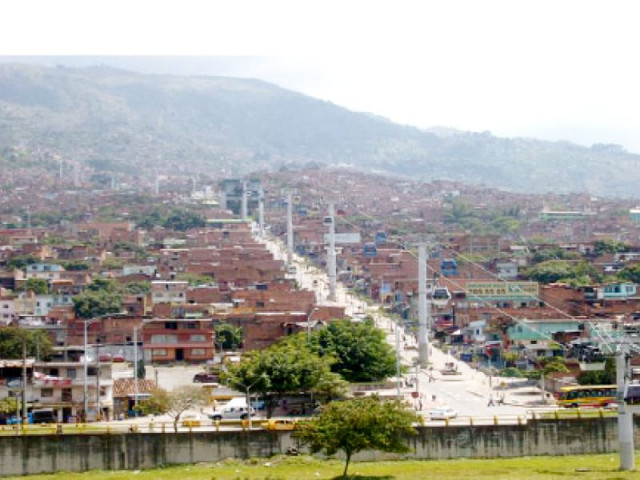For hope of sustainable development, Karachi need only look at Medellín
The focus areas of Medellín have been slums improvement and education.

Medellín is a great example that sustainable development can be achieved even against insurmountable odds. Once considered the ‘drugs and crime capital’ of the world now proudly claims a reputation of being one of the most innovative cities. PHOTO: FARHAN ANWAR
When one envisions the implementation of 'sustainable development' practices in Karachi, the response normally triggers pessimism and cynicism.
Security concerns and a continuing decline in governance and public services are the main obstacles; now being provisioned through non-formal and illegal mechanisms. It is true that we live in a 'conflict zone' in Karachi and various mafias are eroding the writ of the state. Urban population is increasingly being divided along ethnic, political, racial and religious lines. These divisions are now even physically manifested. We live as 'gated communities' and population movements and settlements are taking place along various 'divides'.
Until the critical stakeholders of the city amicably resolve their 'conflicts', there is little chance of sustained, equitable and wide ranging inclusive growth. What is needed is a will to put the inclusive growth requirements at the forefront.
And to find an example to follow, Karachi needs only to look at Medellín. Last month's World Urban Forum hosted 22,000 participants who discussed a variety of urban development challenges. The theme of the conference was 'cities for life'; cities that promote equitable growth. The city hosting the conference - Medellín - is a living example that it can be achieved even against insurmountable odds. Medellín in Columbia, once considered the 'drugs and crime capital' of the world, now proudly claims a reputation of being one of the most innovative. Joseph E Stiglitz, an economics Nobel laureate and professor at the Columbia University writes that in Medellín, in the 1980s and 1990s, crime and lawlessness were not just emerging from a control of politics and the streets by drug cartels but 'also in the extreme inequality in Medellín and Colombi - on the steep Andean slopes of the valley that cradles the city, vast slums, virtually abandoned by the government, provided a ready supply of recruits for the cartels'. The drug cartels filled the vacuum of public service provision and held the city hostage.
When the law and order situation improved, a major contribution in transforming the city's fortune was not political wheeling and dealing and under-the-table bargaining but innovative investments in infrastructure development, particularly public spaces, to facilitate bonding between previously divided communities.
The city's 'Metro-cable system' won the prestigious Harvard University's Veronica Rudge Green Prize in Urban Design last year. The transportation system links formal and informal settlements, energises street life and hence facilitates social cohesion.
The 'Medellín Metrocable' - an aerial tram system - serves settlements on the city's hillsides, formerly some of Medellín's most crime-ridden and gang-infested areas. Residents of the formerly marginalised settlements now find a quick access to the city's main subway system. And movement for recreation from the settled to the previously no-go hillside areas has already begun.
'Place making and the Future of Cities', a best practices report by the Project for Public Spaces, also praises the transformation of the city. "When constructing the Metrocable, the city took the opportunity to invest in improving the long-neglected hillside barrios," it states. "Plazas at the bases of the pylons supporting the tram have become lively neighbourhood centres, with food vendors, seating, and landscaping. Parks, sporting fields, and libraries have been constructed nearby. New schools were built, and older ones were improved. Pedestrian walkways link parts of the city that used to be controlled by rival gangs, and murder rates have plummeted."
The other focus areas of Medellín have been slums improvement and education.
Much needed political will and a consensus among political, business and civil society to put the city's wider interests ahead of their own is vital. The city's stakeholders must decide upon a framework where everyone benefits from a prosperous, inclusive, vibrant, and cosmopolitan Karachi; which it once was and can be again.
Farhan Anwar is an urban planner and runs a non-profit organization based in Karachi city focusing on urban sustainability issues
Published in The Express Tribune, May 19th, 2014.



















COMMENTS
Comments are moderated and generally will be posted if they are on-topic and not abusive.
For more information, please see our Comments FAQ